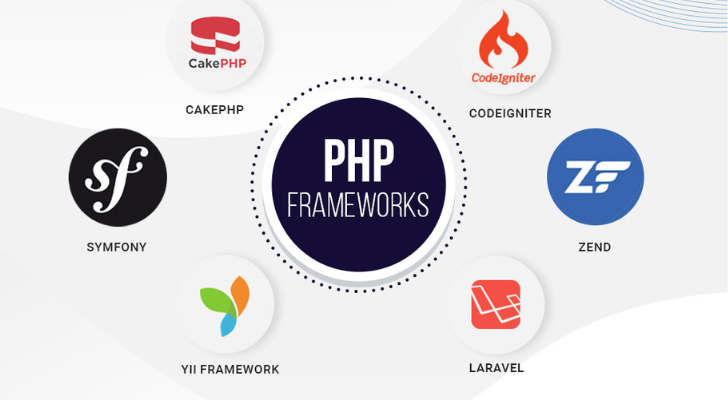PHP Framework

PHP, a versatile server-side scripting language, forms the backbone of countless dynamic websites and applications. To streamline the development process and adhere to best practices, developers often turn to PHP frameworks. These frameworks provide a structured foundation, encourage modular coding, and expedite the creation of robust web applications. Let's delve into the world of PHP frameworks, exploring their key features, benefits, and some popular choices in the realm of web development.
Key Features of PHP Frameworks:
-
MVC Architecture:
- Most PHP frameworks follow the Model-View-Controller (MVC) architectural pattern.
- MVC separates the application into three interconnected components, enhancing code organization and maintainability.
-
Database Abstraction:
- PHP frameworks often include database abstraction layers, simplifying database interactions.
- Developers can work with databases using higher-level abstractions, reducing the need for complex SQL queries.
-
Object-Relational Mapping (ORM):
- Many frameworks incorporate ORM systems that map database tables to objects, streamlining database operations and reducing manual SQL coding.
-
Security Features:
- PHP frameworks include built-in security features to prevent common vulnerabilities, such as SQL injection, cross-site scripting (XSS), and cross-site request forgery (CSRF).
-
Reusable Code Components:
- Frameworks encourage the use of modular and reusable code components through libraries and packages.
- Developers can leverage pre-built modules to expedite development and ensure consistency.
-
Template Engines:
- Template engines within frameworks simplify the creation of dynamic views by separating HTML from application logic.
- This enhances code readability and maintainability.
-
Routing and URL Handling:
- Frameworks provide routing mechanisms that map URLs to specific controllers and actions.
- Clean and customizable URLs improve user experience and SEO.
-
Middleware and Filters:
- Middleware components and filters allow developers to intercept and modify HTTP requests and responses, facilitating tasks like authentication and logging.
Benefits of Using PHP Frameworks:
-
Rapid Development:
- Frameworks provide a structured environment that accelerates the development process.
- Developers can focus on application logic rather than dealing with repetitive tasks.
-
Code Organization:
- MVC architecture enforces a clear separation of concerns, promoting modular and organized code.
- This enhances code maintainability and readability, making it easier for teams to collaborate.
-
Scalability:
- PHP frameworks offer scalability, allowing applications to grow seamlessly in response to increased user traffic and expanding feature sets.
-
Community Support:
- Popular PHP frameworks have large and active communities.
- Community support includes forums, documentation, tutorials, and a wealth of third-party plugins and extensions.
-
Security Best Practices:
- Frameworks implement security measures by default, reducing the likelihood of common vulnerabilities.
- Developers can leverage built-in features and practices to enhance the security of their applications.
-
Consistent Coding Standards:
- Frameworks often enforce coding standards, promoting consistency across projects.
- This ensures that developers adhere to best practices, leading to cleaner and more maintainable code.
Popular PHP Frameworks:
-
Laravel:
- Known for its elegant syntax and developer-friendly features.
- Emphasizes expressive code, an intuitive ORM (Eloquent), and a powerful template engine (Blade).
-
Symfony:
- A robust and highly modular framework.
- Components can be used independently, making Symfony versatile for projects of varying scales.
-
CodeIgniter:
- Lightweight and easy to learn.
- Suitable for small to medium-sized projects, offering simplicity and flexibility.
-
Yii:
- High-performance framework with a strong emphasis on security.
- Follows the convention over configuration (CoC) and Don't Repeat Yourself (DRY) principles.
-
Zend Framework (Laminas Project):
- A collection of professional PHP packages.
- Offers a high level of flexibility for developers to choose and use components as needed.
-
Phalcon:
- A C-extension-based framework for high performance.
- Provides a full-stack environment while maintaining low overhead.
Choosing the Right PHP Framework: Selecting the most suitable PHP framework depends on project requirements, team expertise, and scalability needs. Laravel is often favored for its modern features, while Symfony is chosen for large, enterprise-level projects. CodeIgniter appeals to those seeking simplicity, Yii emphasizes performance, and Zend Framework offers flexibility.


